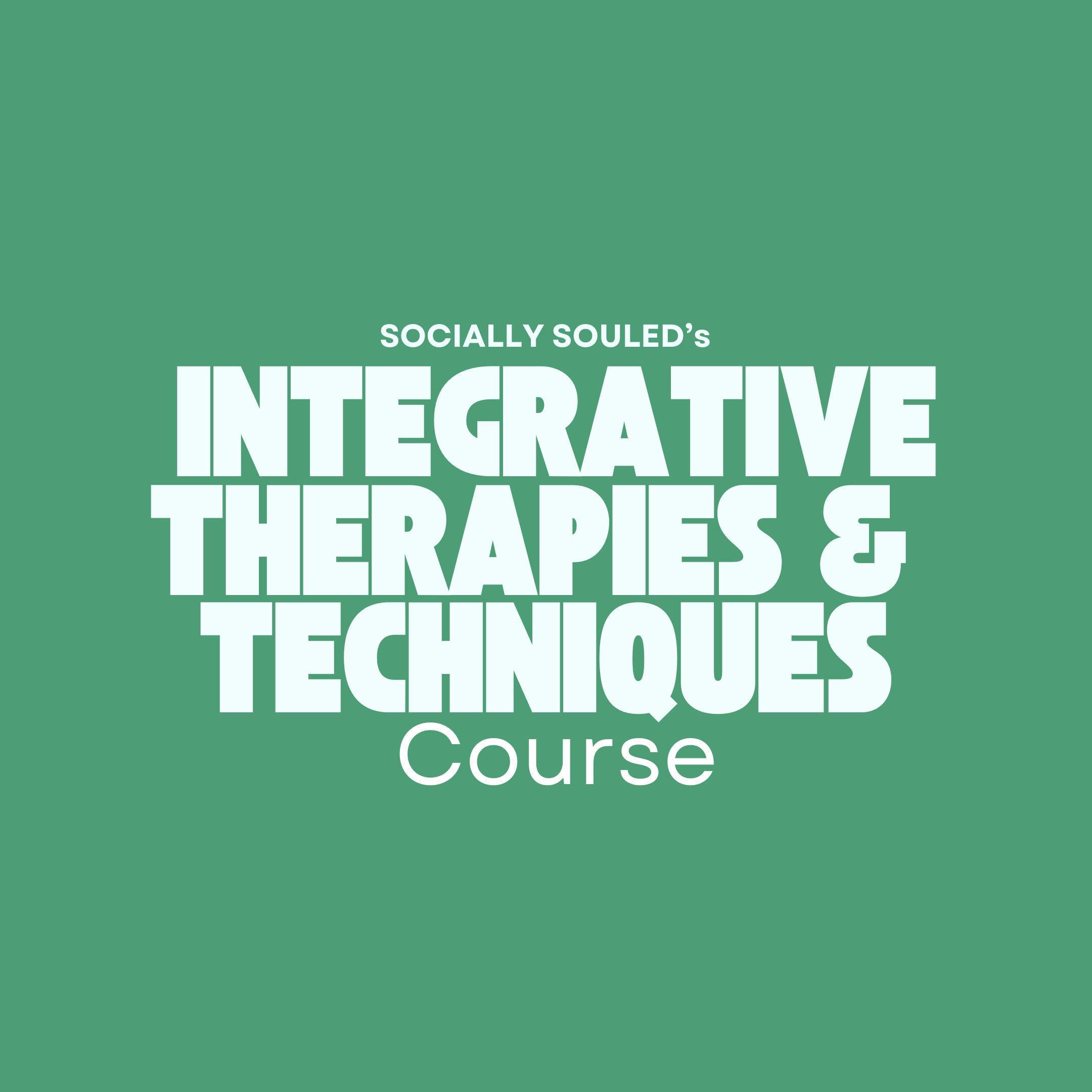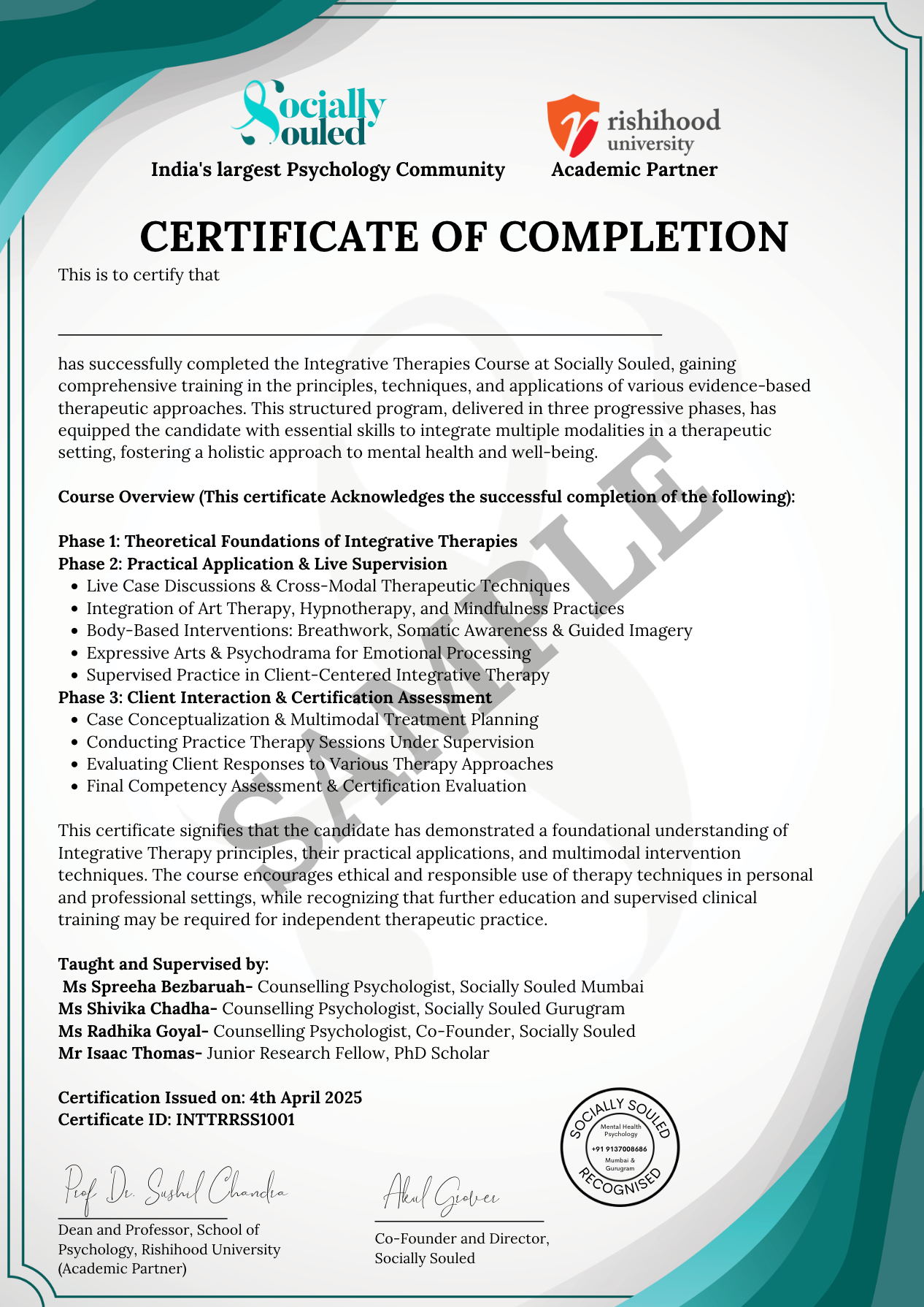
Integrative Therapies Course
Why choose this programme?
Why choose this programme?
Program Structure: A 3-Phase Learning Experience
-
Self-Paced Learning (Phase 1)
Learn the Theory -
Live Training (Phase 2)
Practice the Skills -
Supervised Cases (Phase 3)
Gain Real World Experience
Phase 1: Self-Paced Learning (Theory & Foundation)
📌 Objective: Build a strong theoretical foundation in integrative therapy before moving on to live, interactive practice.
Learn at Your Own Pace with structured pre-recorded modules.
✔ Bite-Sized Video Lessons (10-15 min per topic)
✔ Downloadable workbooks, self-assessment quizzes, and templates
Exclusive Access to Our Learning Management System (LMS) for Self-Paced Modules.
Topics Covered:
- Introduction to Integrative Therapy: Understanding its history, evolution, and core principles.
- The Mind–Body Connection: Exploring how thoughts, emotions, and physical sensations interact.
- Yoga Nidra/ Non Sleep Deep Rest
- Progressive Muscle Relaxation (PMR)
- Emotional Freedom Technique (EFT)/Tapping
- Hypnotherapy
- Autogenic Training
- Loving-Kindness Meditation
- Sensorimotor Psychotherapy
- Mindfulness-Based Approaches (MBCT, MBSR)
- HeartMath Coherence Training
- Dream Analysis and Interpretation– Evidence-Based Applications and Research Findings
- How Integrative Therapy Differs from Traditional Approaches

Educators & Supervisors
Ms Spreeha Bezbaruah- Counselling Psychologist, Socially Souled Mumbai
Ms Shivika Chadha- Counselling Psychologist, Socially Souled Gurugram
Ms Radhika Goyal- Counselling Psychologist, Co-Founder, Socially Souled
Mr Isaac Thomas- Junior Research Fellow, PhD Scholar
Phase 2: Live Training & Skill Development
📌 Objective: Enhance your practical skills through interactive live training sessions that bridge theory and application.
Topics Covered in Live Training:
• Case Study Analysis: Reviewing real-life examples of integrative therapy interventions.
• Live Demonstrations: Guided sessions on techniques such as mindful breathing, guided imagery, and progressive relaxation.
• Role-Plays and Interactive Exercises: Practice applying integrative modalities in simulated therapy sessions.
• Group Discussions and Breakout Sessions: Collaborative exercises to refine your decision-making and adaptability.
Topics Covered in Live Training:
- – Course Orientation and Overview of Integrative Modalities – Live Q&A to address questions from the self-paced modules
- – Guided Mindful Breathing and Body Scan Practice – Interactive session focusing on developing sensory awareness
- – Live Demonstration of Guided Imagery and Safe Place Visualization – Discussion on the scientific basis behind visualization and relaxation
- – Role-Play Exercise: Applying Guided Imagery for Stress Relief – Case Study Discussion on how visualization alters emotional responses
- – Live Session on Progressive Muscle Relaxation Techniques – Introduction to Yoga Nidra as a method for deep relaxation
- – Group Practice: Conducting a Yoga Nidra Session – Feedback and discussion on relaxation outcomes
- – Live Demonstration: Combining Self-Hypnosis with Mindful Breathing for sleep – Discussion on integrating multiple techniques for enhanced sleep quality
- – Case Discussion: Using Integrative Techniques to Manage Anxiety – Role-Play: Simulating a session for stress reduction and improved sleep
- – Live Role-Play Exercise: Implementing EFT Tapping and Sensorimotor Techniques – Focus on challenging and reframing negative physiological responses
- – Group Discussion: Integrating Techniques for Complex Cases – Peer Feedback on technique application
Phase 3: Supervised Casework & Certification
📌 Objective: Demonstrate mastery of mindfulness techniques in real-world or simulated client sessions, receive detailed supervision, and complete final assessments for certification.
✔ Direct Trainer Feedback on Your Sessions.
✔ Case Study Reviews & Real-World Problem Solving.
✔ Supervised Skill Development
Supervised Practice & Certification Requirements:
- Conduct a minimum of one client session (with a friend, partner, or simulated client) using integrative therapy techniques.
- Record your session and submit detailed session notes and case reports.
- Prepare a final case study that details a comprehensive integrative therapy technique.
- Pass the Final Competency Assessment for Certification.
Practical Applications of the Integrative Therapies Certification
Enhance Professional Therapy & Counseling Practices
Design and Conduct Mental Health Workshops & Support Groups
Personal Growth & Self-Development

Facilitate Holistic Healing & Wellness Programs
Support Therapy Practices as an Assistant
Lay the Foundation for Advanced Specialization

What You Get with This Course
- Self-Paced Learning – Build a solid theoretical foundation through structured video modules and comprehensive workbooks.
- Live Practice Sessions – Engage in guided meditations, interactive role-plays, group exercises, and real-time Q&A sessions.
- Live Training with Role-Plays, Case Discussions & Q&A Sessions.
- Hands-On Supervised Therapy Practice
- Mentorship & Support from Industry Experts.
- Certification Recognized for Career Growth.
Who is This Course For?
-
Psychology Students and Graduates
interested in a holistic approach to emotional regulation and stress management. -
Counselors, Mental Health Professionals and Wellness Coaches
seeking to enhance their mindfulness techniques. -
Social Workers, Educators & Corporate Wellness Professionals
looking to promote mental well-being in various settings. -
Individuals seeking
to develop a personal mindfulness practice and cultivate long-term resilience—no prior experience required.
Frequently Asked Questions (FAQs)
-
The program is self-paced + live training. On average, students complete it in 3-4 months, depending on how quickly they move through the phases.
-
No, this course is beginner-friendly! Whether you're new to mindfulness or already working in psychology, this program helps build and refine your skills.
-
All live classes are recorded and uploaded to our LMS. You can access them anytime.
-
Yes, the course is designed to provide you with actionable skills and techniques that can be immediately implemented. Case studies, role-playing, and interactive sessions facilitate hands-on learning that ensures you can apply the concepts effectively.
-
In Phase 3, you’ll conduct live sessions and submit recordings for trainer feedback.
-
- After completing the course, participants may have access to a community forum for ongoing discussion, periodic webinars for course alumni, and opportunities for supervision or consultation on challenging cases.
